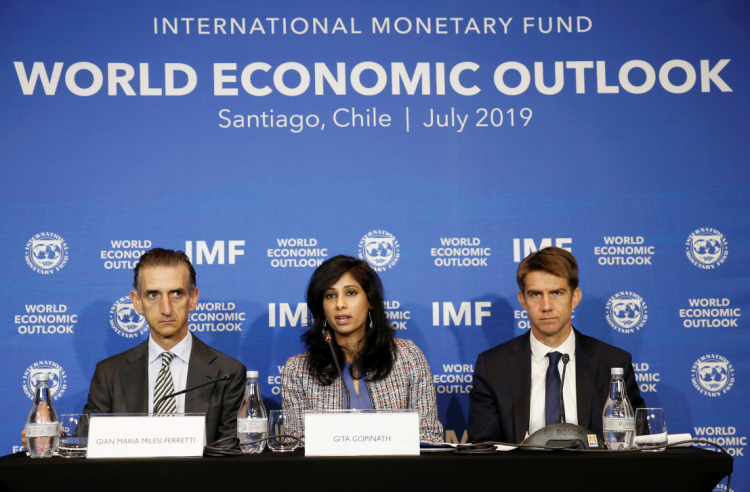The International Monetary Fund (IMF) expects global growth in 2019 to be lowest since the Great Recession of 2008 due to Trump's trade war against China.
The IMF downgraded its global growth expectations for 2019 to 3%, the lowest since the Great Recession of 2008. At this level, the global growth projection is a 0.3 percentage point downgrade from the April 2019 World Economic Outlook. Growth is projected to climb to 3.4 percent in 2020. This growth is, however, a 0.2 percentage point downward revision compared with April.
The IMF said the upgrade mostly reflects a projected improvement in economic performance in some emerging markets in Latin America, the Middle East and emerging and developing Europe now under macroeconomic strain. It said over the past 10 years, a dozen or so countries have wound-up with lower levels of real GDP compared to what they had at the turn of the decade. Among these countries are Greece, Iran, and Libya. The IMF noted flat economic growth in Ukraine and Italy.
It said a projected slowdown in China and the United States plus prominent downside risk might trigger a much more subdued pace of global activity. To forestall such an outcome, it recommends the U.S. undertake policies decisively aimed at defusing trade tensions. These new policies should also reinvigorate multilateral cooperation, and provide timely support to an economic activity where needed.
Policymakers should address financial vulnerabilities posing risks to growth in the medium term in order to strengthen resilience. The overarching policy goal is to make growth more inclusive, which is essential for securing better economic prospects for all, contend the IMF.
The institution noted global growth plummeted sharply over the past year. This profound weakening has been broad-based among advanced economies, especially the United States and most especially the Eurozone and smaller Asian advanced economies. The slowdown in activity is worse across the emerging markets and developing economies. These include Brazil, China, India, Mexico, and Russia.
The Economist Intelligence Unit (EIU) seems to share the IMF misgivings. It adds patterns of global growth are changing and that growth itself can no longer be taken as a given.
"I expect that growth will be roughly half as fast in the 2020s as it was in the 2010s," estimates, Simon Baptist, EIU chief economist.
"The fastest-growing countries will be in Africa (although not Nigeria) and south and south-east Asia, with Bangladesh, Kenya and the Philippines all looking at a strong decade," he said.
Countries with the fastest aging and declining populations such as Japan, Italy, and Portugal can expect growth close to zero. Baptist said aging will likely cause difficulties such as strengthening currencies and increased healthcare needs in emerging markets like China, Russia, and Thailand.
Baptist also foresees a continuation of political instability due to rising literacy and cheaper communication cost (that is, the internet) in emerging markets.
"As this week's protests over anti-Muslim laws in India show, the policies that result from these shifts in communication do not always facilitate well-being or growth," he said.
Baptist said the EIU anticipates a "sustained divergence" between the U.S. and China in trade with intractable differences extending far beyond the mutually damaging18-month trade war between the world's two leading economies.
"Both sides will be putting companies and other countries into uncomfortable positions as a result," said Baptist.






